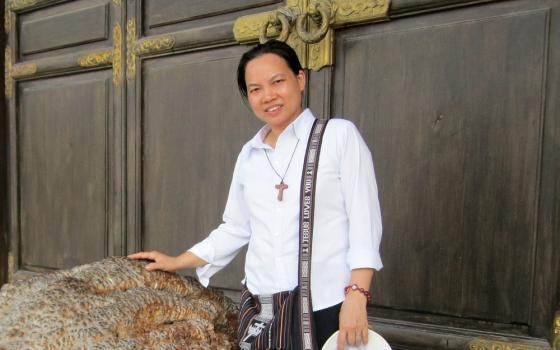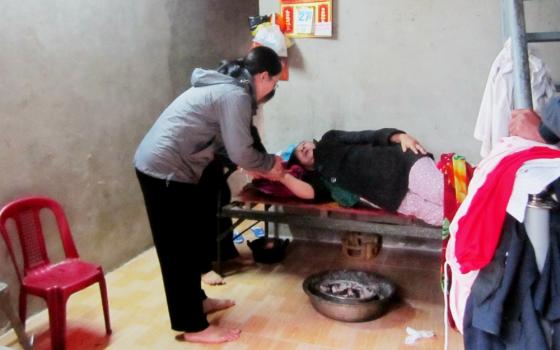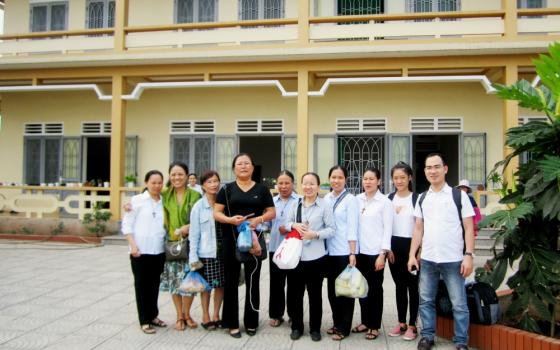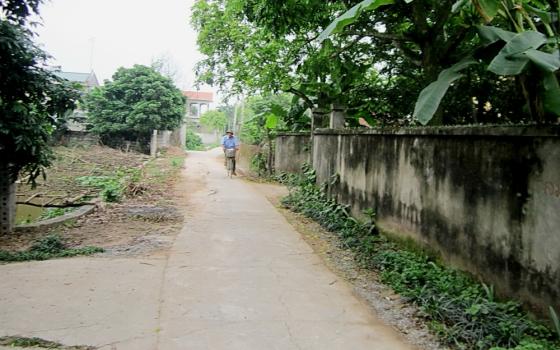For the past five years, Sr. Mary Do Thi Thuy of the Daughters of Mary Immaculate has quietly brought health care to hundreds of villagers with HIV in the Chinh Ly Commune of Ha Nam Province, northern Vietnam.
In 2012, Thuy started her service in the commune by staying at her friend's house and working with patients. Eventually, government authorities approved her work and she set up a center to support patients.
Since 2006, Chinh Ly Commune has been known for the number of its members with HIV. Local young men who had no jobs in the commune went to look for jobs in provinces in northern Vietnam near neighboring China. They worked for traders and caught HIV by abusing drugs, then transmitted the disease to their wives.
Local HIV workers record 1,047 people with HIV/AIDS among the total population of 12,000 in the commune. An estimated 100 people have died of HIV.
Most of people in the commune are not Catholic. They grow rice, fruit trees and flowers, raise poultry and work for others for a living. Many work in other places.
Vietnam has 220,000 people with HIV, 40 percent of whom can afford to buy medical insurance. Thuy, a pharmacist, recently talked about her work, problems from the government, and drug abusers.
GSR: How did you start your ministry with people with HIV/AIDS?
Thuy: While I was working with people with HIV in Hanoi, I paid some visits to Chinh Ly Commune, 50 kilometers away from the capital. My parents used to live in the commune before they fled to the south in 1954.
I found that many local people suffered the disease but got no medical treatment. They did not dare to confess their disease for fear of discrimination among local people. Many also abused drugs.
In 2012, my superior allowed me to come to serve patients in the commune.
How did you approach patients?
I had a friend living in the commune. She is a member of a secular society. I stayed at her house, wore ordinary clothes and worked on farms like other people. I visited families and listened to their problems.
Many farmers lived in poverty, and young people went to provinces bordering China for jobs. They carried and transported illegal goods from China for a living. Drug addicts got HIV by sharing drug needles, but they did not know the disease. They returned home and transmitted the disease to their wives.
Patients were depressed about their future and abandoned their relatives. Their children dropped out of school when they were sixth- and seventh-graders. Many stole things from others, became addicted to playing online games and abused drugs.
Many people have died of AIDS, leaving their families in poverty. Many widows and children get infected with the virus from their husbands and fathers. Many people live alone after their relatives die.
A woman whose family name is Nguyen has two sons who died of AIDS in 2006 and 2008. Her only daughter, at the age of 15, works away from home. The woman at age of 53 lives alone and sells loaves of bread to local people for a living. She earns 25,000 to 30,000 dong [$1.10 to 1.30] per day.
Now there are 100 terminal patients in the commune.
What have you done for them?
I tried to console them, offered them free food, medicine, coffins, and showed their relatives how to care for them.
Two other sisters have been sent to help me. We bought a plot of land and built a two-story building where patients meet and share their problems with one another every three months. Those in good health on Sundays help us prepare food and carry by motorbike to 50 HIV/AIDS patients at a hospital in Hanoi.
Patients also introduce new patients to us and ask us to help people in need.
The patients offer good advice to new patients and people with high risk of developing the disease and encourage them to have medical tests at hospitals.
We educate patients how to look after their health and give them money to do small business and raise poultry and cattle to support their families. We have their houses repaired.
Terminal patients stay at the building for treatment.
Through work, we form good relationships with patients, who welcome us like their family members. We offer advice on health care and HIV prevention to all people in the commune.
We are most concerned about children whose parents died of HIV/AIDS. They now live with their grandparents, but where will they live in the future after their grandparents die? For example, a woman called Huong, 71, supports her grandson and granddaughter. The first, 13, left school and the latter, 10, is in the elementary school.
We offer bicycles and scholarships to orphans, and provide them basic education.
We are happy to bring good news of Jesus to the needy.
What problems do you face?
At first, local authorities caused problems to me for fear that I collected information on people with HIV and reported it to the media. One time, they threatened to expel me from the commune. I moved to patients' houses. Patients marched to the commune's headquarters, asking authorities to allow me to stay with them because they need me.
I also told authorities that I volunteer to look after patients. Many of them are relatives of authorities.
Now, the government approved me of being a resident in the commune but bans me from converting people. We are treated like Catholic volunteers and not allowed to run a house for orphans.
The two other nuns still live temporarily in the commune.
What about drug addicts?
Drug addicts enter our house with knives in their hands asking us to give them money, or they steal our things. One night in March, drug abusers stole 20 hens, five ducks and three dogs from us. They think we are rich.
In some cases, we use a soft approach with them, giving them clothes, instant noodles, rice and fruits and then they leave.
We believe God keeps us safely.



